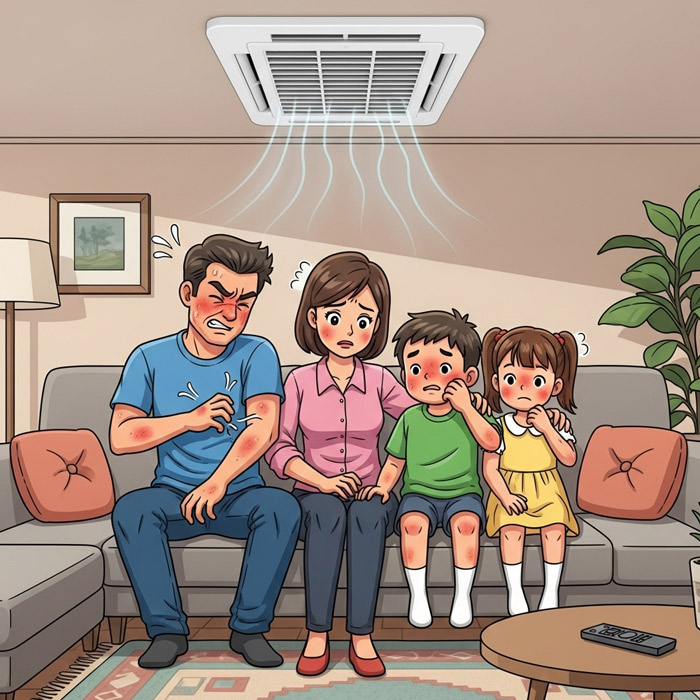
Learn about indoor environmental sources of skin irritation (such as water quality, dry air, and hidden plumbing or HVAC issues), and how homeowners can get relief.
Skin irritation can come from several indoor factors that people don't think about. Water quality, dry indoor air, poor airflow, or hidden issues inside plumbing or HVAC systems can push the skin to react. This blog walks through some common indoor environmental sources of skin irritation and offers practical steps contractors use to help homeowners get relief.
Water-Related Problems
The water that flows through your home's pipes interacts with your skin every day. Its composition, from mineral content to additives, can be a major source of cutaneous distress. A variety of factors, from the municipal source to your own plumbing, can turn your daily wash into an irritating event. Below are common water-related issues and their professional remedies.
Chlorination and Chemical Additives
Municipal water is treated with chemicals like chlorine to keep it safe. These disinfectants can strip the skin of its natural protective oils, leaving it dry and vulnerable. This constant disruption makes it difficult for the skin to maintain its moisture. A contractor can install a whole-home carbon filtration system to remove chlorine and other synthetic compounds from your water supply before they reach your taps.
Hard Water and Mineral Buildup
Hard water contains a high concentration of dissolved minerals, particularly calcium and magnesium. These minerals leave a residue on your skin that can clog pores and disrupt the skin's barrier. This film also prevents soaps from rinsing cleanly. The most effective fix is a water softener system installed by a plumbing professional, which uses an ion exchange medium to remove these hardening minerals.
High Iron or Acidic Water
Water chemistry itself can be an irritant. High levels of iron can feel harsh on the skin, while acidic water (with a low pH) can be mildly corrosive. Both conditions contribute to dryness and irritation. A plumber can test your water and install specialized equipment, such as an oxidizing filter to remove iron or a pH-neutralizing system to balance acidic water.
Water Heater Issues
Sediment, rust, and minerals can collect at the bottom of your water heater tank over time, becoming a breeding ground for microbes. When you use hot water, these particles are stirred up and can come into contact with your skin. A contractor can perform a regular flush of the tank to clear out this accumulation and can inspect and replace the anode rod, a component that prevents corrosion.
Contaminants from Aging Plumbing
Older homes with plumbing made from galvanized steel or other outdated materials can have issues with corrosion. As these pipes degrade, they can leach rust and metal particles into the water. These contaminants can be a direct cause of skin irritation. For persistent problems, a plumber might suggest a partial or complete repiping of the home using modern, stable materials like PEX or copper.
Low Water Pressure
While it may seem unrelated, low water pressure can indirectly lead to dry skin. It often prompts people to take longer and hotter showers to feel clean. This prolonged exposure to hot water, especially hard or chlorinated water, strips away the skin's natural oils. A plumber can diagnose the cause of low pressure, which could be a hidden leak, mineral buildup, or a faulty pressure regulator, and implement a fix.
Low Indoor Humidity
The moisture content in your indoor air, known as humidity, deeply affects skin health. When the air is too dry, it acts like a sponge, drawing moisture out of your skin. This leads to the familiar feelings of tightness, flakiness, and itching, particularly when indoor climate control systems are working hard.
Dry Air from Heating Systems
During cooler months, furnaces, boilers, and other heating systems warm the air. This heating action dramatically lowers the air's relative humidity, leaving it arid. This parched indoor atmosphere constantly saps moisture from your skin. The most comprehensive solution is a whole-home humidifier, which an HVAC contractor can integrate directly with your furnace to add a controlled amount of moisture to the circulated air.
Overcooling in Summer
Air conditioners cool a home by removing both heat and humidity. An oversized unit or one that runs too frequently can strip excessive moisture from the air, dropping humidity levels below a comfortable threshold. Even on a hot day, this can lead to skin dryness. An HVAC professional can assess if your system is sized correctly and can also suggest a whole-home humidifier, which can operate with the fan alone to add moisture without heat.
Air Quality Issues
The air inside your home is a mixture of gases and microscopic particles. When the balance of these particles is thrown off by pollutants and irritants, your skin can be one of the first parts of your body to react. A number of factors related to your home's ventilation and filtration can introduce these problematic elements into your breathing air.
Dust and Allergens from Dirty Filters
An HVAC system's air filter is designed to capture airborne particles. When it becomes clogged with dust, pet dander, and pollen, it can no longer do its job. The system then circulates these allergens throughout your home, where they can land on your skin and trigger reactions. An HVAC contractor can advise on the correct type of filter for your needs and set up a regular replacement schedule.
Mold or Microbial Growth in Ducts
The dark and sometimes damp environment of air ducts can become a habitat for mold and other microbes. When the system activates, it blows these biological contaminants and spores into your living areas. These particles can cause skin inflammation and allergic responses. A professional duct cleaning can remove the existing contamination, and an HVAC contractor can install an in-duct UV-C light purifier to neutralize microbes in the airflow.
Air Leaks Pulling in Irritants
Small gaps in your home's foundation, walls, and around windows can allow unfiltered air from outside, attics, or crawlspaces to be pulled inside. This air is often full of dust, insulation fibers, and other pollutants. A contractor can conduct a diagnostic test, like a blower door test, to pinpoint these leaks and can then professionally air-seal your home to stop the infiltration.
Unbalanced Air Circulation
An improperly balanced HVAC system may deliver poor airflow to certain rooms, causing air to become stagnant. This allows airborne irritants to build up in higher concentrations in those areas, increasing your exposure. An HVAC contractor can perform air balancing by adjusting dampers in the ductwork to promote consistent circulation of clean, filtered air to every part of the house.
HVAC System Malfunctions
Your heating and cooling system is a complex machine intended to maintain a comfortable indoor climate. When parts of it are dirty or malfunctioning, it can accidentally become a source of skin-aggravating problems. From dirty components to improper sizing, these mechanical flaws have a direct impact on your well-being.
Dirty Blower Components
The blower fan is the heart of your HVAC system, pushing air through the ducts. If the blower wheel and its housing are caked with dirt and grime, the system will distribute these fine particles into your home with every cycle. A comprehensive HVAC tune-up by a qualified contractor includes a deep cleaning of these blower components.
Poor Temperature Control
A faulty thermostat or a struggling HVAC unit can cause significant temperature swings, which often correspond with fluctuations in humidity. This forces your skin to constantly adjust to changing conditions, often leading to periods of excessive dryness. A contractor can calibrate a problematic thermostat or diagnose the underlying mechanical issue causing the poor performance.
Clogged Condensate Drains
Air conditioners and high-efficiency furnaces remove a lot of water from the air, which is carried away through a condensate drain line. If this line becomes clogged, water can back up, fostering mold and mildew growth inside the unit. The system then circulates this musty, spore-filled air. Regular professional maintenance includes clearing the condensate drain to prevent this from happening.
Oversized or Undersized HVAC Systems
The size of your HVAC unit matters. A system that is too large for the home will heat or cool it too quickly and shut off before properly dehumidifying the air. A unit that's too small will run constantly, struggling to keep up and potentially making the air excessively dry. An HVAC professional can perform a precise load calculation to determine the correctly sized equipment for your home.
Plumbing and Ventilation Problems
Some of the most overlooked sources of skin irritation stem from issues with plumbing and ventilation. These problems can introduce airborne pollutants or encourage behaviors that are harsh on the skin. Addressing them can bring surprising relief from chronic discomfort.
Poor Bathroom Ventilation
A bathroom that lacks a proper exhaust fan and venting traps a large amount of warm, moist air after every shower. This creates a perfect environment for mold and mildew to grow on surfaces. These spores can become airborne and trigger skin reactions. An electrical, ventilation, or plumbing contractor can install a new, powerful exhaust fan that is correctly vented to the outdoors.
Slow Drains or Sewer Gases
When drains are slow, the decaying organic material trapped inside can produce airborne irritants. In more serious situations, problems with the main sewer line or vent stack can allow sewer gases to enter the home. A plumber can professionally clean drains and use a specialized camera to inspect the sewer line for blockages or damage, correcting any venting issues.
Skin irritation may improve when indoor conditions get fixed, but it's still wise to pay attention to symptoms that stick around. The plumbing and HVAC issues explained in this blog may indeed play a part, yet skin irritation can also come from other causes that a doctor should check. Anyone dealing with discomfort that continues or changes should contact a medical professional. With household triggers reduced and proper medical guidance if needed, the skin has a better chance of settling down.


